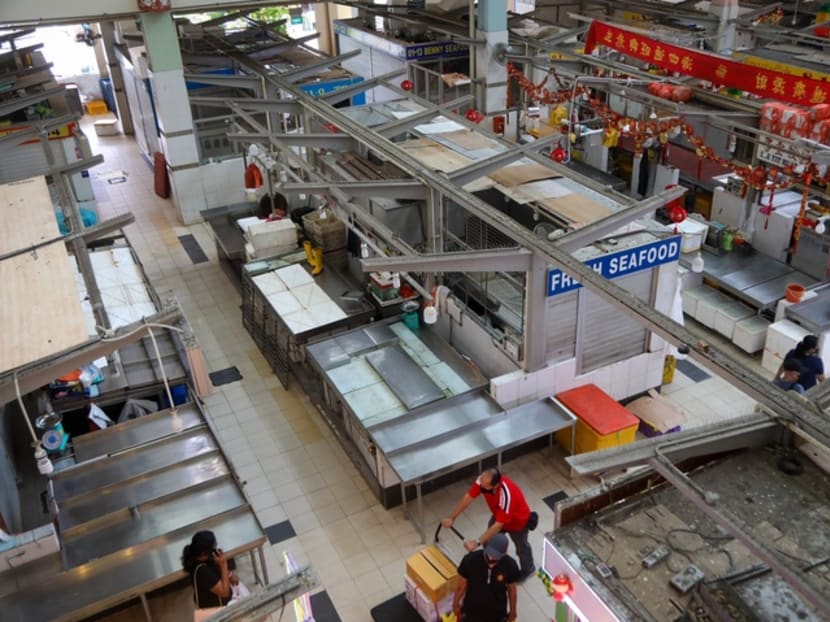Covid-19: Mandatory TraceTogether-only check-in to be introduced at all wet markets, hawker centres
SINGAPORE — With the rise in Covid-19 cases in wet markets and hawker centres, compulsory TraceTogether-only SafeEntry check-in will be progressively rolled out at all wet markets and hawker centres islandwide in the coming weeks.
- In the coming weeks, mandatory TraceTogether-only SafeEntry check-in will be progressively rolled out at all wet markets and hawker centres
- Seniors tend to congregate at these places, where there is high potential for disease spread with people close to each other and taking masks off
- The change to compulsory check-in will facilitate quicker contact tracing to curb potential Covid-19 spread
SINGAPORE — With the rise in Covid-19 cases in wet markets and hawker centres, compulsory TraceTogether-only SafeEntry check-in will be progressively rolled out at all wet markets and hawker centres islandwide in the coming weeks.
This means that other methods used for SafeEntry check-in, such as scanning the venue's Quick Response (QR) code and using the SingPass mobile application, will be discontinued.
Therefore, visitors can only check into these venues using their TraceTogether app or token, the Ministry of Health (MOH) said in a statement on Tuesday (July 20).
This is to facilitate quicker contact tracing in order to curb potential transmission at these settings.
Wet markets and hawker centres are places that seniors tend to congregate and the potential for Covid-19 transmission is high given mask-off activities or the close proximity of people there, MOH added.
During a briefing held on Tuesday by the Government’s Covid-19 task force, Health Minister Ong Ye Kung announced that 28 markets have been identified where there was at least one resident who was infected with the coronavirus.
On Monday, 10 markets were linked to the Jurong Fishery Port cluster and the day before, 11 markets, not including Hong Lim Market and Food Centre in Chinatown and Chong Boon Market and Food Centre in Ang Mo Kio announced earlier.
Mr Ong said that on Sunday, National Environment Agency (NEA) personnel had the “very difficult” task of advising fishmongers that they could not sell because they might expose their patrons to the virus.
“I can imagine how hard it is for the fishmongers.”
Mr Ong said that he had spent a “nervous” weekend hoping that few out of the 1,120 fishmongers and their assistants who had been tested were infected with Covid-19.
In the end, 30 out of the 1,120 tested positive, which represented “considerable exposure at the markets”.
On Sunday, the authorities announced that NEA and the town councils of various public housing estates would be progressively putting in place access control with interim fencing and mandatory SafeEntry check-in at markets where Covid-19 cases have been detected among stallholders or stall assistants.
Associate Professor Kenneth Mak, MOH’s director of medical services, also gave an update on the Covid-19 situation here.
Through the authorities’ testing and surveillance measures, the following groups have been tested:
More than 3,400 people linked to the cluster at karaoke clubs and lounges
More than 1,800 people who visited the ComfortDelGro Driving Centre have been tested
More than 3,100 from Hong Lim Market and Food Centre
More than 7,600 people linked to the fishery port and wet markets
These testing and surveillance operations have detected at least 119 cases of Covid-19 so far, he said, but the numbers will continue to rise with the latest figures, which will be announced later on Tuesday.
“They will provide you with a sense of the scale and magnitude of community testing that is ongoing.”
Assoc Prof Mak added that phylogenetic testing done on the cases detected at Jurong Fishery Port had found the Delta variant to be the cause of the disease in this cluster.
“The identified variant of concern has features that are similar to what we’ve seen in other cases that we have picked up in imported cases in Indonesia,” he said.
“So we believe that infection in this cluster has been introduced perhaps through a sea route into the fishery port, likely from Indonesian or other fishing boats that have brought fish into the port.”
Still, Assoc Prof Mak said that the exact mechanism of transmission from the boats to the stall operators in the port “isn’t entirely clear”.
“We have identified a potential nexus of activity shared across the different clusters,” he said.
For example, the authorities found a Covid-19 case who worked at Jurong Fishery Port and who also frequented a KTV lounge during that person’s infectious period. However, the testing was unable to determine if the person had transmitted any infection, he added.
Efforts have been made to make operations at the port “as contactless as possible”, Assoc Prof Mak, said but he noted that it is challenging to maintain safe distancing measures at the port due to its hot and humid environment and the nature of the activities there where workers have to handle heavy barrels of fish and ice.
As such, some maskless interactions would have likely taken place there. Fomite transmission on contaminated surfaces and at the stall also “remains a strong possibility for transmission”, he said.
There is no evidence so far that transmission is occurring through contaminated fish, he added.
“We believe the fish that we still consume and enjoy remain safe for consumption.”
Assoc Prof Mak pointed out that there have been outbreaks of Covid-19 within wet markets detected overseas, including the first reported coronavirus case in Wuhan, China.
There have also been outbreaks in markets in Thailand, Sri Lanka and Europe.
“This is an area where we will continue to work closely with our partner sector-leads to review the safe management protocols in place and to review the need for routine regular testing to detect infections early in these settings and disrupt potential chains of transmission,” he said.












